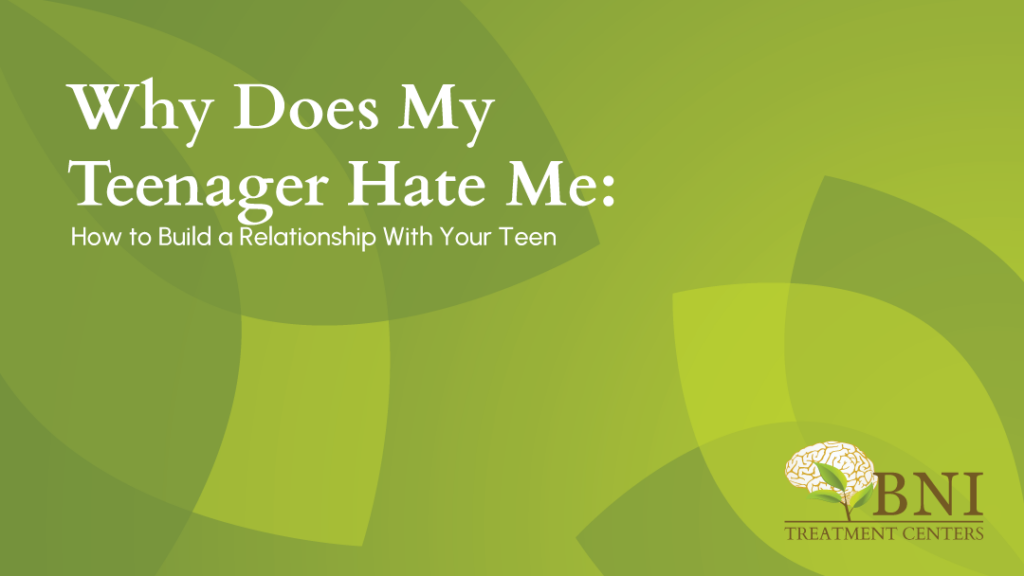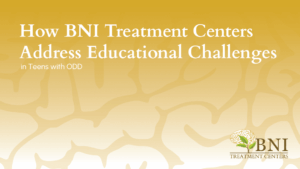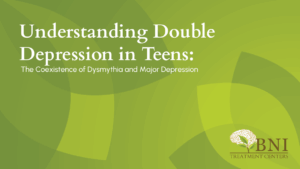
“Children become frustrated and resentful when they view their parents as not being interested in how they feel and in their point of view.” – Haim G. Ginott
It’s a common phrase for parents to ask: “Why does my teenager hate me?”
Hormonal, physical, and mental changes in teens can result in negative behaviors. While changes are normal, there may be underlying mental health conditions causing some of their reactions.
BNI Treatment Centers specializes in treating the mental and behavioral health of adolescents. Today, we are discussing different reasons behind why your teen may be acting negatively toward you.
Why Does It Seem Teens Hate Their Parents?
Being a parent is difficult, and it can seem like despite your best efforts, your teens still treat you poorly. They may give an attitude when asked questions, refuse to help with chores, and seem to never want to spend time with you. The teenage years are a crucial time as their bodies undergo many physical and hormonal changes. It is normal for them to put some distance between themselves and their parents, but what about when they blatantly treat the parents negatively? Let’s look at this further and see where it stems from.

Reasons Why You May Feel Your Teen Hates You
Hate is a strong word, and chances are, your teen does not feel that way. They may be creating distance for many different reasons, such as wanting their own independence or not receiving the emotional care they need. Distance can be in the forms of pushing the parents away with their words and/or actions as well as staying away from home as often as possible. Though they may desire attention from their parents, they may feel like pushing away feels safer as it will prevents hurt feelings.
They Don’t Understand How They’re Treating You
Teenagers are still learning how the world works, which includes how they communicate with others. The way they say what they are feeling may come out as harsh or annoyed even though they don’t mean it to. Parents and adults have had longer to learn what can and should be said in each moment to be considerate of others. Addressing that with your teen can help them understand how and what they can say to express their feelings in a positive manner.
Their Stress Response Is Still Developing
The teen years are plagued with physiological changes, including how the brain responds to stress. There are significant shifts in the hypothalamic-pituitary-adrenal (HPA) axis reactivity specifically, which results in higher levels of the stress-induced hormone response. Because of this, the limbic and cortical systems that are developing during adolescence can be more sensitive to these shifts. The reactions to stress can lead to psychological concerns including depression, anxiety, and substance use, all of which alter the teen’s emotional responses to their parents.
They Are Not Adjusting to Changes and Mental Health
Teenagers have a lot going on between school, social status, activities, puberty, and peer pressure. An article from UCLA noted in 2021 that 45% of youth between ages 12 and 17 experienced mental health difficulties here in California. On top of that, the article also discussed a study looking at the biggest psychological challenges that youth were facing, including:
- 58% living in poverty
- Around 36% facing gender and gender identity distress
- Almost 43% for race and ethnicity
- 38% for immigration status
Coupling poor mental health with puberty, your teen may be acting negatively because of these changes and social expectations. Mental health care is crucial for teens, and seeing your teen act out is a sign they may be asking for help.
How to Handle When Your Teen Is Mean to You
Though math tells us two negatives can make a positive, that is not always the case when discussing emotions. Reacting just as negatively to your teen will only fuel the fire and increase the chances of future arguments. Remain calm, let them cool down, and don’t be afraid to bring up that their words hurt. These behaviors typically don’t have to do with you as a parent, and once everyone is calm, a conversation about what is really going on can be very beneficial.
If your teen is not opening up and behaviors are not improving, consider offering other mental health resources. Seeing a therapist can help them open up and disclose what is going on in their life. It is possible they experienced trauma and are embarrassed or ashamed to let you in. Post-traumatic stress disorder (PTSD) can set in for teens who are carrying unresolved trauma, worsening mental health. Therapists who specialize in PTSD will help the teen develop coping skills for the future while healing past traumas.

Getting Help for Your Teenager’s Mental Health in Los Angeles County
Finding mental health care for your teen is the best solution for managing future behaviors. Allowing your teen to experience therapy and mental health education will give them insight into themselves and why they do what they do. Teens experience pressure and stress every day, and offering them a place to heal can be the relief they need for a brighter future.
Your teen doesn’t hate you, and if you feel at your wit’s end, there is hope. BNI Treatment Centers offer a safe and mental health treatment center for teens to heal and express themselves. Our centers are all backed by an expert team of psychiatrists, specializing in teen care. Call us today at (888) 522-1504 to learn more about our program offerings.
BNI Treatment Centers: Science-based, evidence-backed, compassion-led.




